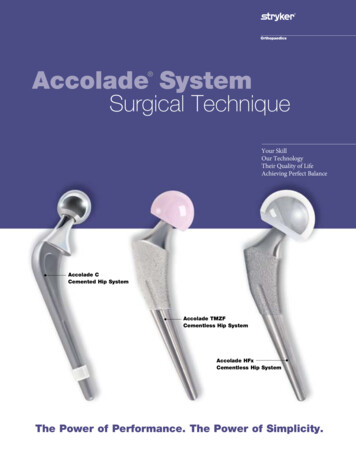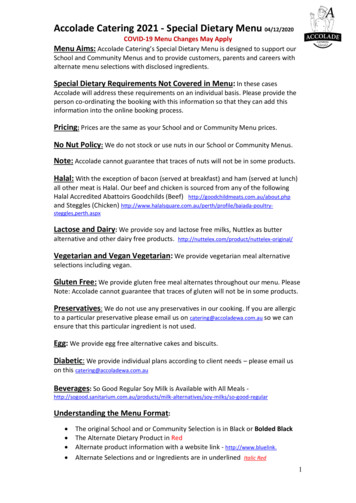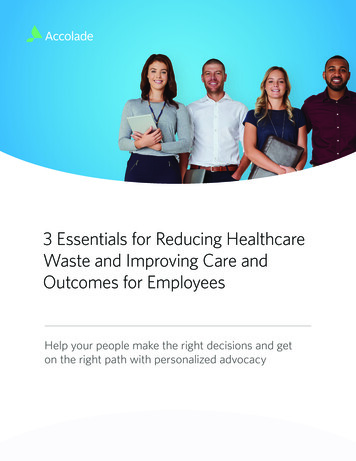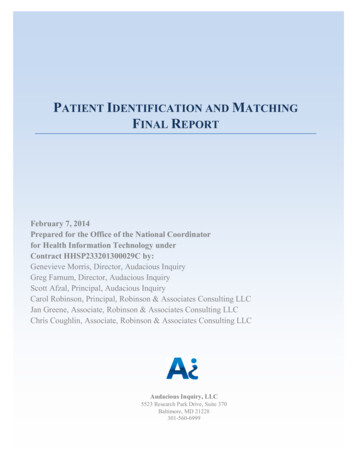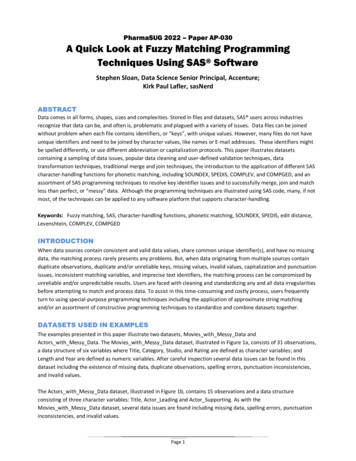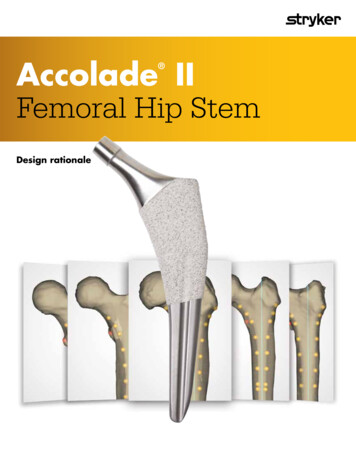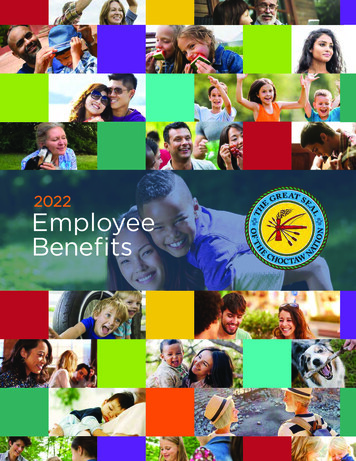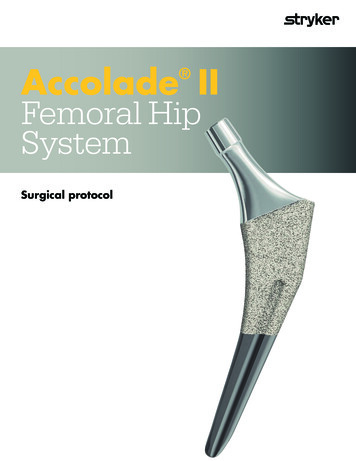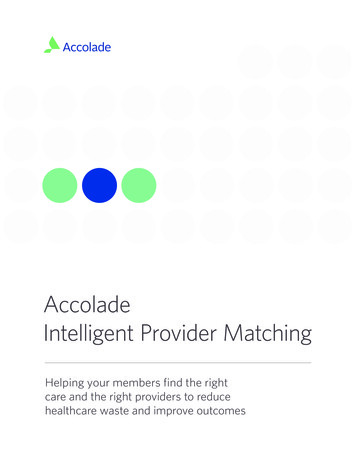
Transcription
AccoladeIntelligent Provider MatchingHelping your members find the rightcare and the right providers to reducehealthcare waste and improve outcomes
Finding the right care has never been more challenging. Accolade can help.The U.S. healthcare system is the most complex in the world. Under the strain of COVID-19, it has become eventougher to navigate. As more primary care clinics close their doors, and as the shortage of physicians and mentalhealth professionals grows, your employees and their families face more hurdles finding and accessing the rightcare at the right time. Delayed or poor healthcare decisions can lead to poor health outcomes, wasted healthcarespending, and escalating costs. Helping your people navigate to the right care at the right time is now an urgentimperative for employers, especially as financial pressures grow under the weight of the pandemic. But how doyou help those employee families find the right path?Consumers surveyed have avoided50%seeking medical care due to thebarriers of finding, accessingand paying for healthcare.The 2020 Change Healthcare – Harris Poll Consumer Experience Index found that half of consumers surveyedhave avoided seeking medical care due to the barriers of finding, accessing and paying for healthcare.Accolade can help. Accolade Health Assistants and a team of clinicians, including nurses, behavioral healthspecialists, and pharmacists, help your employees and their families better understand and utilize their benefits,and find the right care and the right healthcare providers for them. Our integrated approach combines industryleading data intelligence, appropriateness of care measures, and deep insight—not just about the members wesupport but also the healthcare providers we recommend—helping your employee families find the best path forimproved health outcomes and lower healthcare cost—for them and for your organization.
Table of ContentsCommon Failures Lead to the Wrong Provider, Inappropriate Care . 4Intelligent Provider Matching Overview . 6Opportunity Analysis . 7Engaging Members Early to Influence Decisions . 8Finding the Best Matched Providers for Each Member’s Unique Needs . 10Scheduling Appointments, Preparing Patients, and Coordinating Care .13Monitor Population Improvement in Seeing the Right Providers.15Conclusion.16
Common Failures Lead to the Wrong Provider,Inappropriate CareA healthy young woman has her thyroid gland completely removed only to learn she never had cancer butinstead a severe gluten intolerance. An elderly man gets knee replacement surgery despite having veryhigh blood glucose that day, resulting in life threatening blood clots and a seven-day hospital stay. A youngman continues to experience debilitating pain months after lumbar decompression surgery. It turns out thesurgeon operated on the wrong level of the spine.We’ve all heard stories of healthcare gone awry and the resulting toll on health—not just physical health butemotional, mental and financial health as well. Up to 95% of spinal fusion surgeries, costing in the tens of1thousands of dollars, have been shown to be ineffective in relieving pain. Nearly a third of breast cancers2are misdiagnosed. In fact, over treatment, failures in the execution of care, poor care coordination, and wildpricing variance are cited as major sources of healthcare waste in our country—waste estimated to account3for one out of every four U.S. healthcare dollars spent.Seeing the wrong provider or not getting the appropriate care are common events resulting from commonfailures in the consumer healthcare experience:4 Lack of a primary care physician (PCP): One quarter of U.S. adults don’t have a PCP, and nearly half5don’t see one at all, which means they’re likely not getting preventive care or assistance in findinga specialist when needed. This can lead to delays in getting necessary care or getting to the correctprovider (e.g., selecting the local Emergency Room (ER) for care for chronic sinusitis, or choosing anorthopedic surgeon based on their proximity and availability alone.) Inadequate online reviews: Too often, choosing a provider comes down to the opinion of a friendor family member, or worse, strangers online. More than 60% of U.S. adults make decisions about6providers based on what they see on the Internet, even though most online provider rankings relysolely on subjective patient satisfaction reviews and not data about provider sub-specialties orhealth outcomes. Inadequate provider search tools: Provider search tools often focus on cost transparency or patientratings and don’t address member factors that can play a significant role in health and healthcare,barriers such as a financial hardship in the member’s household. The few vendors that do focus onprovider quality offer limited information about a doctor’s specialties and expertise. Lack of understanding of employer health benefits. Most organizations have invested in a widerange of programs and tools to help improve member health and well-being, but less than a quarterof employees say they understand the employer benefits available to them, making them less likelyto be utilized.74
Scheduling challenges: Simply the act of scheduling a provider appointment can become a barrierto getting the right care from the right provider at the right time. The longer the wait time to see aprovider, for instance, the more likely a patient abandons the booking process altogether. There’smore than a 50% drop-off in appointment booking when the first available appointment is more thantwo weeks out – compared to when a provider appointment is available within two days.8 Lack of patient follow-up or care coordination. A lack of care coordination not only escalates thecosts of managing chronic disease by more than 4,500 over three years, but also can lead to sub9optimal care and poor health outcomes. Studies show that even though outpatient follow-up is knownto reduce hospital readmissions, half of patients readmitted to the hospital within 30 days did notreceive it.10With so many potential pitfalls on the road to getting the best possible care, people need supportthroughout the entire healthcare journey, not just isolated stops along the way – like searching for acardiologist. They need personalized guidance from a person they trust, not just access to a self-servicedigital provider search tool.Getting your people to the right care at the right time with the best matched provider for their uniqueneeds requires a comprehensive, proactive and integrated approach driven by insight, compassion anddata intelligence. Comprehensive – engaging all of your members in their health and healthcare journey, not just thosewith chronic conditions or high-cost claims Proactive – taking action to support members every step of the way to avoid points of failure Integrated – factoring in each individual’s physical and mental health conditions, as well as theirbroader life circumstances that can become barriers to care5
Intelligent Provider Matching OverviewAccolade’s Intelligent Provider Matching is a comprehensive, proactive and integrated service that helps yourpeople utilize the benefits, care and providers that can benefit them most. Our matching service combinesindustry-leading data intelligence with the compassion and insight of the Accolade frontline care teams.Features include:1. Opportunity Analysis – Data-driven insight into your organization’s opportunity to control healthcarespending while improving health outcomes by guiding member utilization to recommended providers.2. Member Engagement and Influence: A high-tech, high-touch approach to proactively reaching,engaging and influencing members across the entire population early in their journey, typically beforehealthcare decisions have been made.3. Provider Insights Data and Matching. An industry-leading, data-driven methodology that deliversthe best provider matches based on the member’s individual needs, extensive analysis of theprovider’s experience, adherence to appropriateness of care measures, health outcomes, and costs.4. Appointment Scheduling, Prep and Follow-up. Remove barriers to care with appointment scheduling,preparing members for upcoming visits and procedures, following up after visits or discharge, andcoordinating care.5. Quality Reporting. Monitor our progress as we engage with your members and guide them towardsrecommended providers.6
Step 1: Opportunity AnalysisFirst, the Accolade Intelligent Provider Matching service establishes the opportunities associated with utilizingrecommended providers. Accolade analyzes your population’s historical claims data, targeting the utilization of providersacross seven procedures with the highest potential for healthcare waste: Hip Replacement Arthroscopy Knee Replacement Coronary Artery Bypass Grafting Spinal Fusion Surgery And Neurosurgery Laminectomy(Decompression Surgery)With this baseline opportunity analysis, Accolade will report the percentage of your member population getting carefrom “Not Recommended” providers as well as the improvement you can expect to see using the Accolade IntelligentProvider Matching service. Supported by extensive data intelligence, our nurse-led model increases member utilizationof “Recommended” providers based on their needs, helping you reduce healthcare waste, improve outcomes and controlhealthcare costs.7
Step 2. Engaging Members Early to Influence DecisionsEnsuring members get the best care requires engaging them early in their healthcare journey– before decisions aremade. It requires understanding who they are and what they need so we can guide them to the best decisions aboutcare and physicians.Accolade combines the industry’s most intelligent technology platform with our team’s expertise, insightand compassion in order to engage and influence the members early in their healthcare journey. We uncoveropportunities to step into the member’s care path; we help them avoid common pitfalls and dangerous errors inorder to get them the best care.70%Accolade personalized advocacyassists 70% of members prior tocare being delivered.11Accolade engagement combines inbound member inquiries and targeted, data-driven outreach: Inbound member inquiries. In every inbound interaction with members—via mobile app, online portalor phone—Accolade Health Assistants and nurses work to build insight and understanding about themember and establish trust. Whether a member is reaching out for a new ID card, help with a claim or anyother benefits question, our frontline care teams are proactively uncovering health issues and conditions,contextual details about the member’s life, and opportunities to support their health needs, including helpingthem to find the best matched benefits, care and providers. Targeted, data-driven outreach. Applying data science against 360-degree member profiles, Accoladeuncovers opportunities for our nurses to step into a person’s care path to provide guidance. Our predefinedtriggers alerts Accolade nurses to reach out to members to engage on helping en them find the best careoptions and providers.We can identify those members who are on track for knee or back surgery and can step in to help them getthe musculoskeletal support they need. We can identify those members who don’t have a PCP and haven’thad an annual wellness visit. We can identify those members who use the Accolade mobile app to conduct aprocedure or specialty search. In all of these cases, established triggers alert the Accolade care teamto engage members even earlier than verification of benefits (VoB) or verification of employment (VoE)processes are underway.8
Our intelligent technology platform not only identifies opportunities for engagement, but also enables personalizedoutreach to targeted members. We use multiple channels—phone, digital messaging, and profile alerts—to reachthe right members and help them make the best care and provider decisions.90%Over 90% of members planning to goto the ER follow the guidance of theirAccolade nurse to go to a lower acuitycare setting.12Upon engaging a member, the Accolade nurse uncovers and assesses health needs, works to understand themember’s broader context and barriers to care, finds the providers best matched to their needs, and supports themat every step of the care process—from scheduling and preparing for provider visits to following up, coordinatingcare and referring members to benefits programs and tools.9
Step 3. Finding the Best Matched Providersfor Each Member’s Unique NeedsAccolade Good Match MethodologyNow that we have engaged the member early and gained insight into who they are and what they need, our goalis to help them get to the best care and doctor for them. We want to minimize the risk of inappropriate care,overtreatment and other examples of healthcare waste.Our proprietary Good Match methodology incorporates Global Appropriateness Measures, analysis of 14 billionclaims and billing data, and insight into member populations to provide a thoughtful, data-driven recommendationon the best matched providers for each member’s health needs.55%Americans say they’d seek helpfrom a medical professional moreoften if the right one - and a goodfit - was easy to find13A good match is determined by analyzing a provider in five key areas:1. Provider experience. Accolade measures experience of care at the specialty and sub-specialty level, andalso factors in patient comorbidities. For example, we assess the experience orthopedic surgeons have withhand procedures in patients who also have type 2 diabetes.As a first step in evaluating provider experience, we analyze claims data to understand how often theyperform in their core practice areas relative to their peers. We look at the conditions they treat, proceduresthey perform, and diagnoses most prevalent in their clinical profile, down to sub-specialty. Our evaluation ofprovider experience incorporates both the volume of procedures performed and the portion of the provider’spractice dedicated to a specific procedure. A provider is said to have “high experience” in a specificprocedure if, when compared to their peers, they’ve done this procedure more often.10
2. Appropriateness of Care. Accolade looks at more than 80 Global Appropriateness Measures toanalyze provider decision-making and provide insight into a physician’s relevant experience andoutcomes. For example, Accolade evaluates the frequency that an ObGyn performs a caesareansection, or the rate that a physician chooses knee surgery over alternative treatments. By analyzingthe patterns of care for common conditions and procedures of 1.9 million physicians, Accoladeconnects employee populations to the provider with the most reliable track record.3. Outcomes. Accolade evaluates physician performance and by analyzing claims and clinical datafor readmission rates, surgical site infection rates, their patients’ average length of stay, and otherrelevant outcomes.4. Member attributes. As we incorporate more data and insight about both the member and theprovider into our system, we improve the personalization of the match. For example, a memberneeds knee replacement and is also a diabetic, so our care team investigates providers with “highexperience” ratings performing knee arthroscopy for patients with diabetes – creating a “patientssimilar to me” experience.11
5. Cost transparency. Accolade Intelligent Provider Matching surfaces the average costs for common proceduresand tests within a member’s geographic area, including estimates of the patient cost responsibility. These insightshelp identify providers who provide the right care at the right cost and help ensure the member receives“fair value.”Our provider scoring methodology identifies high-performing providers within a specific clinical domain. Themethodology excludes physicians who: Do not have an active medical license Have medical board sanctions Do not meet the minimum threshold of cases observed in the data within the last five years12
Step 4. Scheduling Appointments, PreparingPatients, and Coordinating CareScheduling provider visits and appointments is a common barrier to getting the best care. It can be a frustratingprocess, especially with providers that have limited availability or a cumbersome scheduling process.Accolade removes this barrier by offering to schedule appointments on behalf of members. When conductinga provider search, an Accolade Health Assistant or nurse offers to schedule the appointment for the member,increasing the likelihood that an appointment will be made and kept. Upon securing the appointment, Accoladeshares the details to the member through the member’s preferred channel, such as on Accolade Mobile. Thissupport is especially valuable for members with non-traditional work schedules, those in need of appointments thatare difficult to secure (e.g., behavioral health, dermatology), or for members with any challenges that may impedeengagement with providers.Appointment scheduling plays an important role in connecting Accolade frontline care teams to providers on behalfof members. By engaging with provider offices before the member visit, our Accolade Health Assistants and nursescan begin critical communication and care coordination with physicians and their teams. Our clinical team can: Advocate for the member to be seen in a timely manner and share important information and membercontext with the provider to help mitigate barriers and better inform care decisions. More effectively prepare the member for what to expect during the visit and provide guidance about theinformation to share and questions to ask.13
By assisting with provider scheduling, our frontline care team is able to build relationships with members that areimportant to the member’s ongoing support. Accolade Health Assistants and nurses follow up after appointmentsto assist members in understanding their visit summaries and discharge instructions, adhere to care plans, andutilize employer benefits programs (such as behavioral health programs, well-being apps, or resources to helpmanage conditions).47%Members have accepted 47%of Accolade offers to scheduleprovider appointments.(Apr 2020 – Nov 2020)It is so helpful and just plain awesome to be able to message someone what you’relooking for in a doctor and for them to find it for you. I have even had reps offer to makeappointments for me if needed. They’re very caring as well.”– Accolade member14
Step 5. Monitor improvement in utilizationof recommended providersEnhanced Quality ReportingThe Intelligent Provider Matching service began with a baseline analysis to understand your members’ utilization of“Recommended” and “Not-Recommended” providers and our enhanced, quality reporting closes the loop.Accolade IQ, our customer reporting platform, is where you will be able to monitor how Accolade’s IntelligentProvider Matching service is benefitting your employee population.Our monthly reporting allows our customers to actually see the increase in the utilization of “Recommended”providers across seven targeted procedures: Hip Replacement Knee Replacement Spinal Fusion Surgery Laminectomy (Decompression Surgery) Arthroscopy Coronary Artery Bypass Grafting And NeurosurgeryBut you can further monitor actions taken by Accolade’s frontline care team and nurses to help guide members to“Recommended” providers. This self-service portal is available to you 24/7 to track key performance indicators –making it easy to assess the gains we are making across your population.Accolade IQ is the only tool you’ll need to manage the performance of your benefits package.15
ConclusionHelping your employees and their families gain access to the right healthcare for their needs has never been morecrucial. As the coronavirus pandemic continues to rage across the country, a portion of your member populationis deferring all care, including the most necessary care, out of fear of contracting the virus. Many don’t have aprimary care physician, and many are struggling to find available providers for procedures we know to be sources ofhealthcare waste.Digital provider search tools and online ranking sites are not the answer.Your people need proactive, personalized support from someone who understands their whole self, not just theirsymptoms and uses advanced data to help them find the right care. They need guidance early in their healthcarejourney, before getting on the path to inappropriate care. Your members need recommendations based on theindustry’s most extensive data set about provider experience and performance. And they need support at eachstep of the way – finding best matched providers, scheduling appointments, preparing for visits, following up andcoordinating care. Accolade’s Intelligent Provider Matching service is the proactive, integrated and comprehensiveapproach that gets your members to the right care at the right time for better health outcomes and lower costs.Learn more by visiting accolade.com16
Sources1KS Dhillon, Malays Orthop J. 2016 Mar; 10(1): 61–68.Spinal Fusion for Chronic Low Back Pain: A ‘Magic Bullet’ or Wishful Thinking?2Bleyer, A., MD, and Welch, H.G., MD, MPH; Nov 2, 2012,Effect of Three Decades of Screening Mammography on Breast-Cancer Incidence3Shrank WH, Rogstad TL, Parekh N. Waste in the US Health Care System: Estimated Costs and Potential for Savings.JAMA. 2019;322(15):1501–1509. doi:10.1001/jama.2019.139784Levine DM, Linder JA, Landon BE. Characteristics of Americans with Primary Care and Changes Over Time, 2002-2015.JAMA Intern Med. 2020;180(3):463–466. doi:10.1001/jamainternmed.2019.628256Tufts Health Plan, Fewer Americans Are Seeing Primary Care ProvidersRoesler, P., May 21, 2018, New Research Shows Why Doctors Need a Strong Online Presence, Inc.7HR Daily Advisor, Oct 16, 2017, Aflac Survey: Only 24% of Employees Fully Understand Their Benefits8Maheshwari, P., - May 31, 2017, Patient access and engagement insights from two million appointments,Becker’s Hospital Review9Brigham R. Frandsen, PhD , Karen E. Joynt, MD, MPH , James B. Rebitzer, PhD , Ashish K. Jha, MD, MPH; May 14, 2015,Care Fragmentation, Quality, and Costs Among Chronically Ill Patients, AJMC, Volume 21, Issue 510Roderka, M., Spring 5-2018, Effect of Primary Care Follow Up on Hospital Readmissions, University of Maine11Accolade customer data12Ibid.13Research from Dr. Nika Kabiri, Founder of Kabiri Consulting and Decision Science instructor at theUniversity of Washington17
Accolade can help. The U.S. healthcare system is the most complex in the world. Under the strain of COVID-19, it has become even tougher to navigate. As more primary care clinics close their doors, and as the shortage of physicians and mental . Hip Replacement Knee Replacement Spinal Fusion Surgery Lamneci tomy (Decompression .
